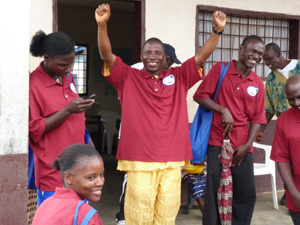Month: December 2014
Pre-school Literacy Development
December 14, 2014
The main focus of most literacy training today has become ESL. There are other valuable areas which also need to be focused on, such as literacy for seniors and adult literacy. Here is an article about a program in the San Joaquin valley that is devoted to developing literacy in children aged six months to five years. It is a collaboration between a literacy society and pediatricians.
The program is implemented during the first five years of life, which offer a critical window for learning with rapid brain development that does not occur at any other time. Many children, especially from low-income families, are not read to from birth. Experts report that children from more affluent households have been exposed to 30 million more words than low-income children, meaning that they arrive at school without basic literacy skills, and often struggle with reading in the early grades.
Reach Out and Read bridges the gap and is a proven intervention backed by 15 independent, published research studies. During the preschool years, children served by the program score three to six months ahead of their non-Reach Out and Read peers on vocabulary tests, preparing them to start school on target. Being ready to begin learning in kindergarten leads to achieving competent reading ability by the end of third grade. Children who don’t read proficiently by the end of third grade fall behind, and many never catch up. In San Joaquin County, according to 2013 statistics, 66 percent, or nearly 7,000 children, left third grade unable to read proficiently. This setback has dire implications for future education and employment opportunities.
In Memory of a Liberian Literacy Leader
December 10, 2014
We are all aware that a lot of people are dying in the Ebola outbreak, especially health workers. We need to keep in mind, however, that every victim is important to someone and may even be making a vital contribution to their society. That is the case with Jacob Sandolo, a principle and fierce advocate for literacy in his country. His recent death will have a great impact on Liberian society going forward.
For months, ne ws services around the world have issued reports on the Ebola epidemic that has savaged West Africa. Since March, there have been over 17,000 reported cases of Ebola and more than 6,000 deaths in Guinea, Sierra Leone, and Liberia. Liberia, the worse-hit country of the Ebola outbreak, with more than 3,000 deaths, has fought this deadly virus with a severely strained public health infrastructure weakened by 23 years of a brutal dictatorship and civil war. Schools have been closed, food is in short supply, and many people are unemployed due to the crisis. News reports have typically spoken of the toll Ebola has taken on healthcare workers—doctors and nurses who have died valiantly in the line of duty, but they have not been the only victims of this deadly virus. In the last week of November, Jacob Sendolo, principal, teacher and long-term officer in the Liberian affiliate of the IRA, also died from Ebola. His death will be felt deeply.
ws services around the world have issued reports on the Ebola epidemic that has savaged West Africa. Since March, there have been over 17,000 reported cases of Ebola and more than 6,000 deaths in Guinea, Sierra Leone, and Liberia. Liberia, the worse-hit country of the Ebola outbreak, with more than 3,000 deaths, has fought this deadly virus with a severely strained public health infrastructure weakened by 23 years of a brutal dictatorship and civil war. Schools have been closed, food is in short supply, and many people are unemployed due to the crisis. News reports have typically spoken of the toll Ebola has taken on healthcare workers—doctors and nurses who have died valiantly in the line of duty, but they have not been the only victims of this deadly virus. In the last week of November, Jacob Sendolo, principal, teacher and long-term officer in the Liberian affiliate of the IRA, also died from Ebola. His death will be felt deeply.
Literacy Council: The gift of literacy
December 10, 2014
What makes a perfect Christmas gift? Is it the latest iPad? The biggest TV? Maybe it’s a diamond ring for a special someone.
Most could agree that the perfect Christmas gift is something that makes another person happy; something they desire and could use to enhance their daily lives, whether that’s watching the game on a bigger TV or having a little extra bling on your finger. But what about a gift that doesn’t involve waiting in line for hours, doesn’t require hundreds of dollars, yet comes with a lifetime guarantee. How about a gift that will forever enhance someone’s life?
There is such a gift. It’s literacy.
The power of literacy lies not only in one’s ability to read and write, but in a person’s ability to understand the world around them. Functional literacy includes reading, technology skills and knowledge of health, math and money. There are about 30 million functionally illiterate American adults. That’s 30 million people whose lives are negatively impacted because they lack the basic skills to follow medical directions, order from menus, navigate city streets and complete online forms for things such as insurance, jobs or travel arrangements.
Functional literacy increases the chance for people to reach their full potential as parents, employees and community members. Without Functional literacy, people fail themselves, their children and their community.
